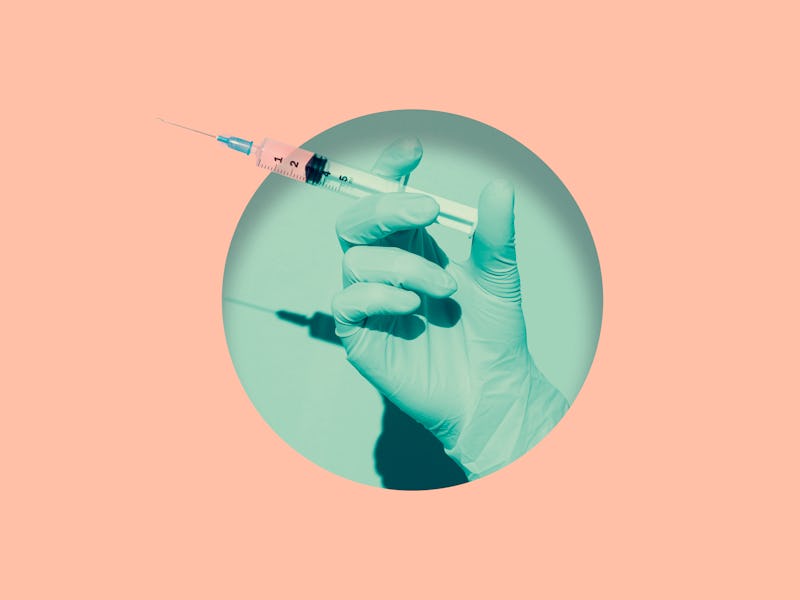Swollen balls and impotency: Fact-checking Covid-19 vaccine claims
There’s no evidence “that any of the Covid-19 vaccines available in the U.S. negatively impact male fertility.”

Met Gala tickets reportedly cost about $35,000 dollars. But in 2021, even if you had the cash you couldn’t get in without another ticket you can get for free: proof you received the Covid-19 vaccine, known to prevent severe disease and death.
That Covid-19 vaccination requirement was enough to keep at least one person from attending the event: Nicki Minaj. Instead, Minaj shared her hesitations, and unfortunately a bit of vaccine misinformation on Twitter.
In particular, she shared an anecdote about a cousin’s friend who Minaj claimed became impotent after receiving the vaccine, suffered from some swollen balls, and was then dumped by his fiancé.
The now infamous tweet.
Urologists have since replied to that tweet with a common message: There’s no evidence that Covid-19 vaccines cause male infertility. Meanwhile, Minaj herself admitted that she’ll probably get vaccinated before she goes on tour. Regardless, that tweet has been shared about 20,000 times without context.
Minaj’s tweet hit upon a sweet spot when it comes to Covid-19 misinformation. It’s a memorable personal anecdote (many vaccine misinformation pages rely on such anecdotes) which relies on a common, but baseless fear: infertility caused by vaccines.
The good news is the infertility myth is easy to debunk with research, says Ranjith Ramasamy, Director of Male Reproductive Medicine and Surgery at The University of Miami Health System.
“There is no current evidence demonstrating that any of the Covid-19 vaccines available in the U.S. negatively impact male fertility,” he tells Inverse.
Instead, Covid-19 is connected to male fertility in another way: Studies show it negatively affects the male reproductive system through a number of avenues, including interfering with sperm production, driving erectile dysfunction, and targeting the testis.
Do vaccines cause infertility?
Ramasamy is the senior author of a research letter published in JAMA investigating the effects of mRNA vaccines on semen parameters (factors like sperm concentration). Sperm parameters aren’t the only way to measure fertility in men, but they’re a foundational measure, Ramasamy and his team report.
That study collected sperm samples from 45 men aged 18 to 50, who provided the team with two sperm samples: one sample before their first vaccine dose, and a second sample, about 75 days post-second dose.
A doctor in Florida receives his vaccine.
The median sperm concentration actually increased after the men received their second vaccine These increases were within normal levels (not evidence that vaccines positively influence sperm factors), so the real takeaway is the vaccine didn’t negatively impact sperm.
This study is small, but it suggests the vaccines have no effect on male fertility. Ramasamy says this takeaway fits with what we know about vaccines in general: “There is no confirmed evidence of any vaccines on the market affecting male fertility,” he says.
The bigger issue is there’s some evidence that Covid-19 may be related to other fertility issues in men, like erectile dysfunction.
In May 2021, Ramasamy published another small study in The World Journal of Men’s Health, examining the penile tissue of two men who had gotten Covid-19 and later developed severe erectile dysfunction (ED). They were compared to another two men who had not gotten Covid-19 but also suffered from ED.
Tissue samples from men who had recovered from Covid-19 still contained viral particles, even after the illness had subsided. Those men also had lower levels of an enzyme (endothelial Nitric Oxide Synthase), which is a marker of endothelial function, and a key part of achieving an erection, compared to the men who never had Covid-19.
This was a small study and it couldn’t prove Covid-19 was the cause of ED in these men. But it suggests the virus has the potential to lead to male fertility issues, whereas the vaccine has shown no such connection.
What about the swollen balls? — Millions of people have received Covid-19 vaccines either in clinical trials or in the real world. Swollen testicle reports are not listed among the common side effects of vaccination.
As more people get vaccinated, more potential side effects might emerge. However, it’s unlikely that Minaj’s cousin’s friend’s swollen testicles are an example of an especially rare or unreported side-effect. Ramasamy says there’s no evidence that vaccines can cause orchitis (also known as swollen balls).
“On the contrary, orchitis has been a side effect occasionally seen in men suffering from active Covid-19 infection,” he says.
Swollen-balls related to Covid-19 could have a similar root cause to Covid-19 related erectile dysfunction. As Ramasamy explains, the virus can pass the blood-testis barrier and “remain there for months following recovery.”
Minaj’s “cousin’s friend” is undoubtedly going through a tough time. But the laundry list of reproductive and relationship problems are probably not vaccine-induced.
In fact, a vaccine might have been able to solve them.